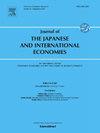Japan's inflation under global inflation synchronization
IF 3.1
3区 经济学
Q1 ECONOMICS
Journal of the Japanese and International Economies
Pub Date : 2025-06-19
DOI:10.1016/j.jjie.2025.101368
引用次数: 0
Abstract
In this paper, we analyze the effects of domestic and global factors on Japan's consumer price inflation, inflation expectations and nominal wages from the late 1990s to the post-pandemic period, using structural vector autoregression (SVAR) models with short- and long-run zero and sign restrictions. We find that global shocks, including global supply, demand, and monetary policy shocks, account for about 40 % and 30 % of variance in four-quarter-ahead headline (excluding fresh food) and core inflation, respectively, and the importance of global shocks increases when post-pandemic data are included. Historical decompositions show that various types of global shocks, including downward cost pressure due to globalization reflected in positive global supply shocks, had persistently pushed down Japan’s consumer price inflation until the late 2010s. Subsequently, their contribution turned positive, both global supply and demand shocks significantly pushing up inflation, especially in the high-inflation phase after the pandemic. In addition, we find that services prices and nominal wages were also pushed up significantly by global shocks in the post-pandemic period.
全球通胀同步下的日本通胀
本文采用具有短期和长期零约束和符号约束的结构向量自回归(SVAR)模型,分析了从20世纪90年代末到大流行后,国内和全球因素对日本消费者价格通胀、通胀预期和名义工资的影响。我们发现,全球冲击,包括全球供应、需求和货币政策冲击,分别占未来四个季度总体通胀(不包括生鲜食品)和核心通胀方差的40%和30%左右,当包括疫情后数据时,全球冲击的重要性增加。历史分解表明,各种类型的全球冲击,包括全球化带来的成本下行压力,反映在积极的全球供应冲击中,持续压低了日本的消费者价格通胀,直到2010年代末。随后,它们的贡献转为积极,全球供应和需求冲击显著推高了通胀,特别是在大流行后的高通胀阶段。此外,我们发现,服务价格和名义工资在大流行后时期也受到全球冲击的显著推高。
本文章由计算机程序翻译,如有差异,请以英文原文为准。
求助全文
约1分钟内获得全文
求助全文
来源期刊
CiteScore
5.10
自引率
6.90%
发文量
36
期刊介绍:
The Journal of the Japanese and International Economies publishes original reports of research devoted to academic analyses of the Japanese economy and its interdependence on other national economies. The Journal also features articles that present related theoretical, empirical, and comparative analyses with their policy implications. Book reviews are also published.

 求助内容:
求助内容: 应助结果提醒方式:
应助结果提醒方式:


